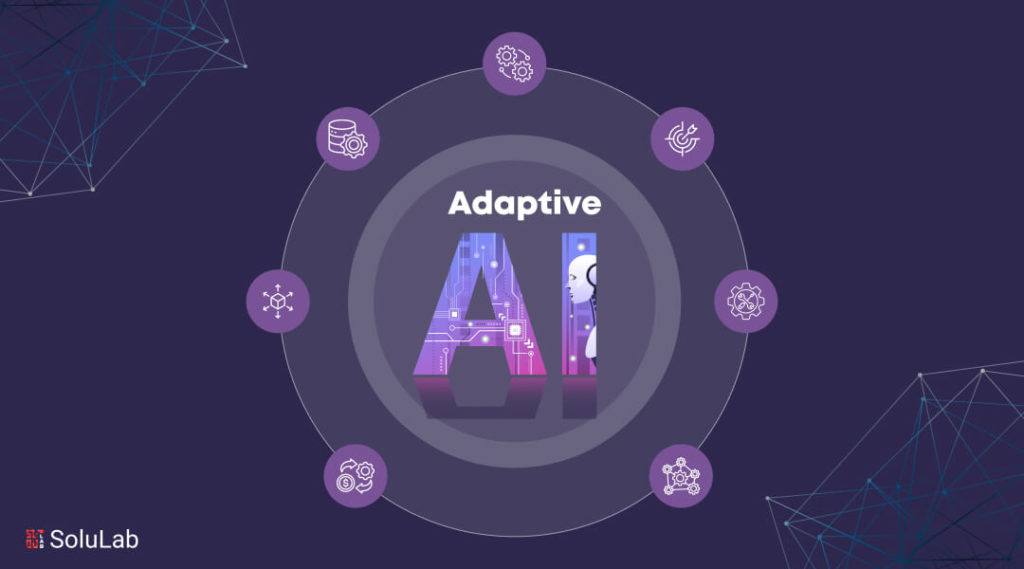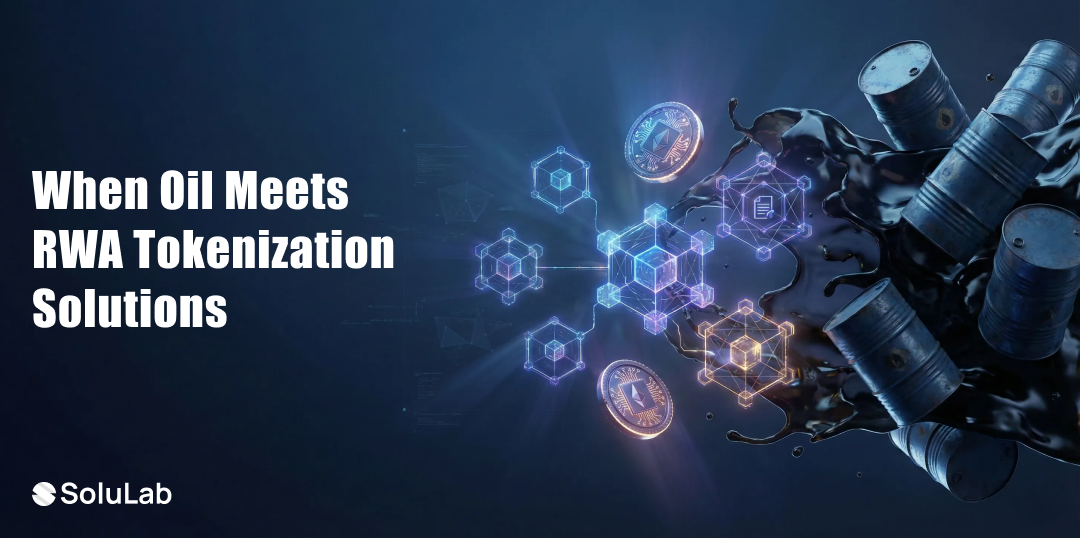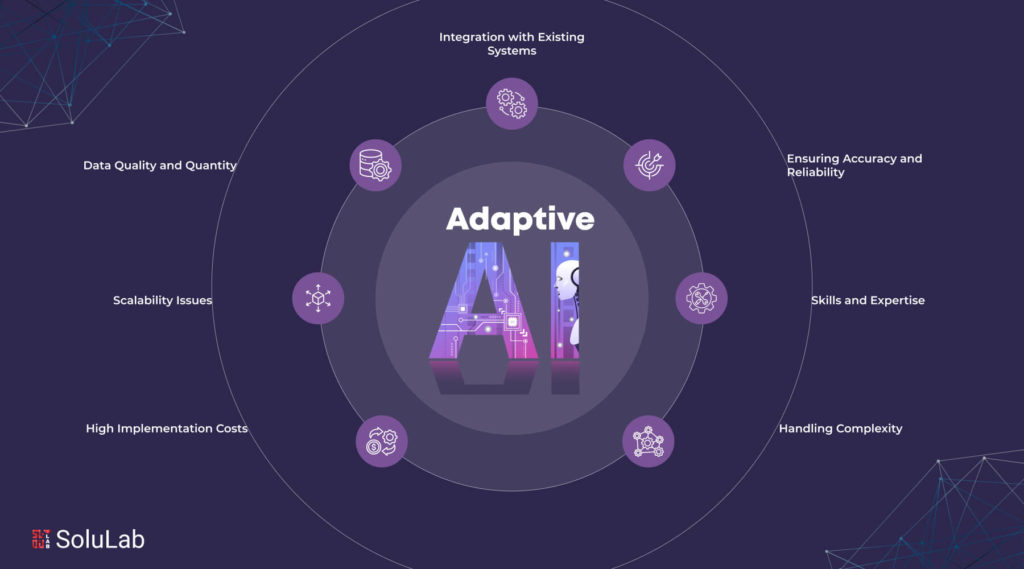
Artificial intelligence that adapts to its environment by learning from data is known as adaptive AI. Since adaptive AI is more flexible than regular AI, businesses like it when things change quickly. Using artificial intelligence systems that can adapt to changing tasks, environments, and situations in a commercial setting is known as adaptive AI.
This is one of the main causes of the widespread adoption of adaptive AI for business across several industry verticals and applications. It is employed in some locations for fraud detection, route optimization, and many other purposes. But you wouldn’t believe the possibilities of adaptable AI. Technology will continue to advance to meet the demands of an increasingly digital world as companies use adaptive frameworks in place of the fixed, historical data of traditional AI. For this reason, according to Gartner, the most important strategic technology trend for 2023 will be adaptive AI. By 2026, businesses that use adaptive AI will beat rivals by 25%, according to Gartner researchers.
In this blog, we will cover adaptive AI use cases across a range of sectors, how adaptive AI can be useful for enterprises, and the challenges associated with deploying adaptive AI.
Overview of Adaptive AI
We will now discuss what is adaptive AI in general. Adaptive AI, as the name implies, is a subset of artificial intelligence that changes quickly in response to situations and inputs. Companies don’t need to constantly or frequently change the AI algorithms in order for the system to operate properly.
Using machine learning skills, adaptive AI technology learns from stored data and adjusts itself when there is a change in the data, which occurs often. Because businesses do not have to invest in cash and resources to train AI frequently, they find adapt AI to be smart and economical.
Adaptive learning AI systems are able to change their behavior based on their experiences, in contrast to more traditional kinds of AI that follow predetermined rules and algorithms and break down when presented with challenges. Without human input, it modifies its own code, offering a degree of flexibility and business resilience never previously seen. As a result, AI can produce better results more quickly.
Adaptive AI systems are distinguished by a number of fundamental characteristics, including:
- Having the Ability to Learn: Algorithms for machine learning enable technology to process and evaluate fresh data. Consequently, adaptive AI has the ability to learn, see trends, and forecast future events.
- Flexibility: When input data or their operating environment change, adaptive AI systems modify their algorithms and decision-making procedures. Because of their adaptability, they are more practical and useful even in unpredictable and dynamic situations.
- Self-improvement: Over time, systems become more capable by evaluating their own performance, discovering areas that are weak or inefficient, and then improving their algorithms accordingly.
- Problem-solving Skills: AI adaptive learning acquires knowledge via experience and adjusts to new data to provide complex and nuanced solutions to issues. These improved problem-solving skills frequently outperform those of conventional AI systems, producing more creative answers to even the most difficult problems.
- Explainability and Transparency: Explainability and transparency are given top priority by the AI systems, enabling people to comprehend the process by which the AI makes judgments. This element fosters confidence and guarantees the technology is developed in an ethical and responsible manner.
These characteristics work together to provide adaptive AI development systems the ability to evolve to constantly changing settings, which makes them appropriate for a variety of real-world applications. Let’s first examine how adaptable AI may be used in any kind of business before delving into its various applications.
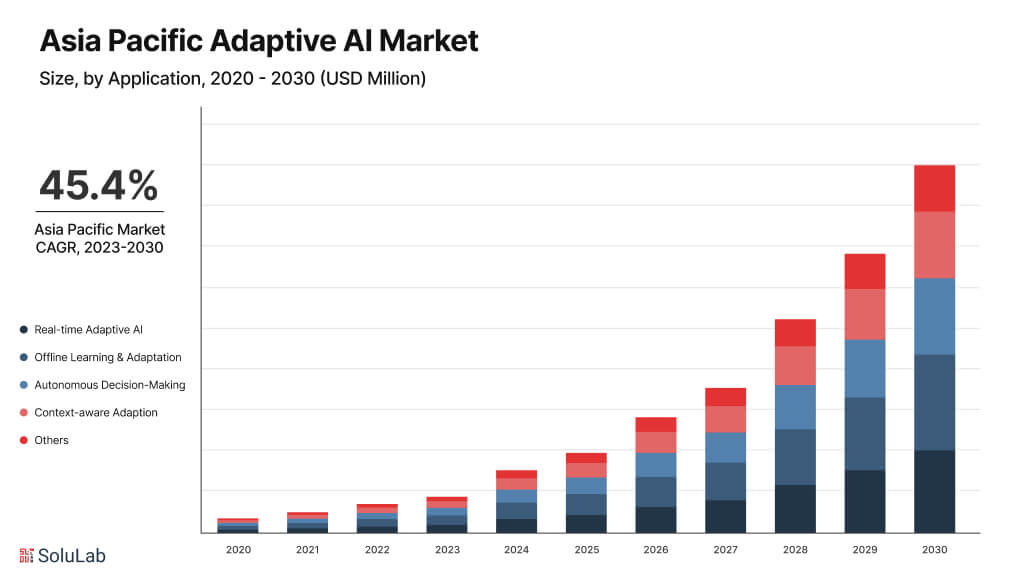
The Most Recent Market Data on Adaptive AI’s Growth in Businesses
Adaptive AI is being used in businesses at a faster pace, as seen by recent market figures showing its disruptive impact. Recent projections indicate that over the next several years, the worldwide market for adaptable AI solutions is likely to rise at a compound annual growth rate (CAGR) of more than 30%, setting new records.
Let’s examine the facts that show how adaptable AI has become more and more popular in enterprises in recent years.
- The market for adaptable AI worldwide was estimated to be worth USD 736.5 million in 2022, and from 2023 to 2030, it is expected to grow at a CAGR of 42.6%.
- According to Gartner, by 2026, businesses that have used AI engineering techniques to create and oversee adaptive AI systems would do better than their competitors in terms of the quantity and duration of artificial intelligence model implementations, outperforming them by at least 25%.
- With 39.16% of the total revenue in the worldwide adaptive AI market in 2023, North America seems to be the most significant region.
These figures do indicate that adaptive AI’s use in business will increase in the next years. Companies that use adaptive AI will benefit from a competitive edge over those that do not.
Let’s now investigate the most prominent AI use cases across several market verticals. Prior to discussing several use cases, let’s examine the difference between Adaptive AI and Traditional AI.
Read More: What Is Manus AI? How to Build a Similar AI Agent for Your Business
Adaptive AI vs Traditional AI
Adaptive AI works better than traditional AI because it can constantly learn, adapt, and personalize responses based on real-time data and changing scenarios. Unlike static models, adaptive AI constantly enhances its algorithms. While classical AI is efficient at some jobs, it lacks adaptive systems’ responsiveness and adaptability.
This is a quick comparison between traditional AI and adaptive AI.
| Features | Adaptive AI | Traditional AI |
| Learning Approach | Continuously evolves using new data and experiences. | Operates based on predetermined rules and set algorithms. |
| Flexibility | Highly adaptable to new tasks and situations. | Limited in adjusting to new or changing environments. |
| Training Process | Constantly learns and improves over time. | Needs occasional retraining or updates to stay relevant. |
| Decision-making | Alters its decision-making processes based on feedback. | Relies on fixed rules and logical structures for decisions. |
| Complexity | Handles complex and dynamic environments effectively. | Better suited for static or clearly defined tasks. |
| Examples | Found in recommendation systems and self-driving cars. | Employed in rule-based systems and traditional algorithms. |
Top Use Cases of Adaptive AI Across Various Industries
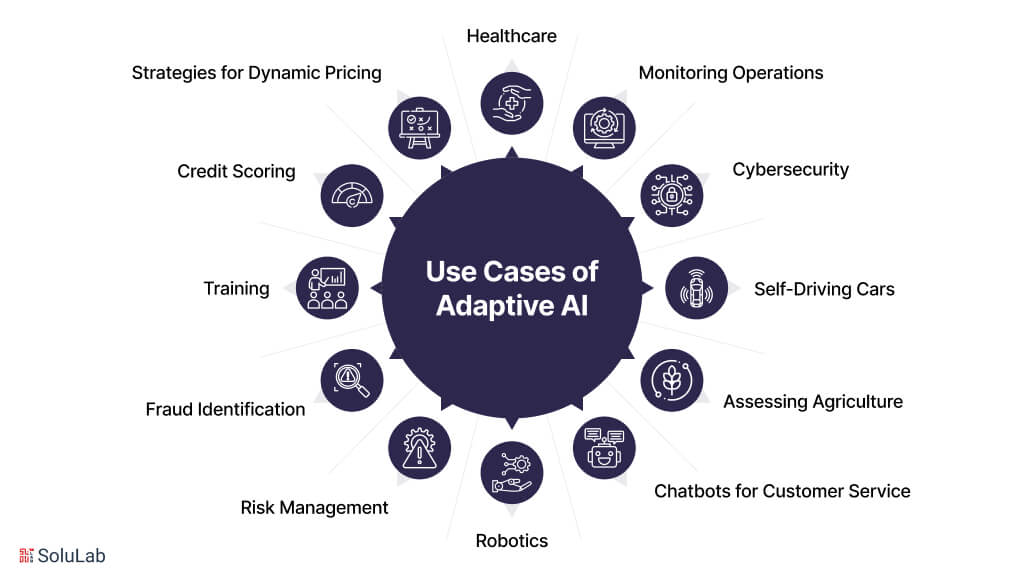
The competitive advantages of adaptive AI, including enhanced customization, operational efficiency, and decision-making skills, are being recognized by businesses more and more. Adaptive artificial intelligence (AI) is revolutionizing several industries, including retail, finance, healthcare, and manufacturing. It is enhancing operations in areas like fraud detection, supply chain efficiency, and customer engagement.
Moreover, greater access to large data and developments in machine learning algorithms are propelling the deployment of adaptive AI across businesses.
The following are some of the top adaptive AI use cases across a range of industries:
-
Healthcare
Using patient data, clinical results, and medical research, adaptive AI learns instantly. With its ability to provide diagnosis, treatment plans, and prognostic insights, it is revolutionizing the healthcare industry. It improves diagnostic accuracy, expedites decision-making, and maximizes the use of available resources. By providing medical personnel with the tools they need to treat patients more effectively, quickly, and individually, adaptive AI raises the bar for both patient care and healthcare delivery. Applications for adaptive AI range from precision medicine to the reduction of administrative tasks.
-
Personalized Care
Patients receive individualized care when using adaptive AI in the healthcare industry. Adaptive AI improves health care by analyzing patient data, including prior medical history, allergies to medications, and any other requirements, and providing personalized treatment suggestions.
-
Analysis of Medical Images
Medical image analysis using adaptive AI is used by healthcare professionals to improve diagnosis. Advanced adaptive AI algorithms are integrated into image analysis systems, including MRIs, CT scans, X-rays, and more.
These algorithms provide improved diagnosis findings to medical professionals and quickly detect irregularities in photos.
-
Monitoring Patients in Real Time
Moreover, adaptive AI facilitates real-time patient monitoring for physicians and other medical professionals. Advanced adaptive AI algorithms and hybrid AI assess patient data collected from IoT devices, including blood pressure, heart rate, and other vital indicators. It notifies medical professionals in case there is a rapid change in the data. Adaptive AI improves real-time patient monitoring overall.
-
Self-Driving Cars
Self-driving cars, also known as autonomous vehicles, are becoming increasingly common. These cars’ adaptive artificial intelligence(AI) manages unforeseen events like traffic bottlenecks, route detours, and weather variations and responds quickly to changing conditions.
-
Robotics
Adaptive AI is also being used in robotics to improve its capabilities, just like it is in autonomous cars. Adaptive AI changes with the times by learning from data. Because of these capabilities, adaptive AI is being utilized in a variety of sectors to manage and operate robots. Because of adaptive AI, these robots can learn from one another without requiring fresh data to be updated.
-
Training
Several industries are also using adaptive learning AI for training. Adaptive AI is essential for educating and training the workforce, from teaching military members to informing employees about new rules. For this reason, a lot of well-known companies are working with the top software development firms in India to create unique systems with adaptive artificial intelligence.
-
Monitoring Operations
Monitoring operations is another use of adaptive AI in the corporate world. Adaptive AI has been applied in many different contexts, ranging from industrial monitoring to backend work management. Adaptive AI, for example, is used in the power and energy sector to optimize energy production and power delivery in response to changes in supply and demand. Businesses may assess and comprehend changing conditions with the aid of adaptive AI, which can also suggest the best course of action.
-
Credit Scoring
Credit scoring is one of the most popular applications of adaptive AI in the banking sector. Adaptive AI algorithms are used by banks and other financial organizations to evaluate loan applicants’ credit ratings based on their prior borrowing experiences. Executives at banks may use this research to make well-informed choices about how to distribute loans to borrowers. All things considered, adaptive AI is very important to the banking industry since it makes credit score analysis easier.
-
Fraud Identification
Adaptive AI, in addition to credit score, greatly aids in spotting possible fraud and notifies banks and financing companies of it. Using machine learning skills, adaptive AI finds anomalies in transactions, credit histories, or KYC procedures. It alerts banks and other financial organizations to any abnormalities and reduces the possibility of fraud.
-
Risk Management
The banking industry also uses adaptive AI for risk management. Risk analysts in the financial industry use the potential of adaptive AI to examine the market, trades, and investment possibilities in order to determine the degree of risk and earning potential. They can employ more effective techniques to lower risk and increase investment returns by having a better grasp of the risk level.
-
Assessing Agriculture
Regarding the applications of adaptive AI, the field of agriculture merits consideration. Adaptive AI is indeed used to assess agricultural lands and determine which locations are ideal for specific crops. For example, when agri-experts use adaptive AI to examine the field, they discover that the soil in that specific area has a high water-holding capacity. They may thus plant crops that need more water on that specific plot of land, like rice. Moreover, adaptive AI is utilized in drones and other agricultural machinery to gather and process data in order to make knowledgeable agricultural judgments.
-
Safety Monitoring and Route Optimization
Adaptive AI is used in logistics and transportation to optimize routes and keep an eye on the security of drivers, vehicles, and cargo. Adaptive AI assesses the traffic and potential routes to provide a real-time recommendation for the quickest path. Similar to Google Maps, where the algorithm makes real-time route recommendations based on traffic conditions. Additionally, by analyzing the distance driven, adaptive AI is also employed to keep an eye on the safety of the drivers and delivery trucks. The logistics team is notified to examine the driver’s safety if there is any delay or significant change in the vehicle’s speed, which is often slowing down or stopping for an extended period of time.
-
Suggestions for Personalized Goods and Services
Retail and marketing employ adaptive AI to provide customized product and service recommendations based on the requirements and preferences of their customers. The adaptive artificial intelligence algorithms present relevant items or services that the consumer is likely to purchase based on their past searches and purchasing behavior. Moreover, adaptive AI provides intriguing promotions on the good or service that the consumer is considering purchasing and aids the marketing team in targeting their audience. This increases the likelihood that the buyer will finish the transaction.
-
Strategies for Dynamic Pricing
Adaptive AI is also useful for dynamic pricing methods in the retail industry. Retailers are given the option to establish a specific price for a product or service via adaptive AI algorithms, which examine supply and demand for the good or service as well as other outside factors that affect the pricing.
-
Chatbots for Customer Service
Moreover, chatbots for customer care in retail and other industries are strengthened by adaptive AI. The best AI developers include adaptive AI in chatbots so they may learn from consumer inquiries and respond with pertinent information to each unique question. Furthermore, the chatbot utilizes adaptive AI algorithms to modify its responses based on the questions posed by customers.
-
Cybersecurity
These days, the frequency of cyberattacks and hacking incidents has significantly increased. The banking and healthcare industries are the main casualties. Nevertheless, cybersecurity professionals advise using adaptive AI as a defense against unapproved cyberattacks.
Adaptive AI recognizes anomalous behavior or illegal access in the security systems and notifies the user. In this manner, professionals in cybersecurity are aware of the impending cyberattack and may take the appropriate precautions to avoid it. Consequently, these are the most common applications of adaptive AI across sectors. Let’s now explore the benefits of adaptive AI in businesses.
Related: Generative AI in Cybersecurity
Benefits of Adaptive AI
Adaptive AI offers numerous advantages, transforming how businesses and industries operate by providing more efficient, intelligent, and flexible solutions. Here are some key benefits of Adaptive AI:
1. Continuous Learning and Improvement: Adaptive AI systems are designed to learn continuously from new data and experiences. This ongoing learning process allows these systems to enhance their performance over time without requiring manual updates or retraining. As a result, they remain relevant and effective even as conditions and data change.
2. Enhanced Flexibility: One of the most significant benefits of Adaptive AI is its flexibility. Unlike traditional AI, which is limited to predefined rules and static scenarios, Adaptive AI can adjust to new tasks and evolving environments. This adaptability makes it suitable for a wide range of applications, from customer service to complex industrial processes.
3. Superior Decision-Making: Adaptive AI systems evolve their decision-making processes based on real-time feedback. This ability to refine and improve decisions leads to more accurate and effective outcomes. Businesses can rely on Adaptive AI for critical decision-making tasks, knowing that the system will adapt and optimize its performance over time.
4. Handling Complexity: Adaptive AI excels in managing complex and dynamic environments. It can process and analyze vast amounts of data, identify patterns, and make informed decisions in real time. This capability is particularly beneficial in industries such as finance, healthcare, and autonomous vehicles, where conditions can change rapidly and unpredictably.
5. Cost Efficiency: By continuously improving and adapting without the need for frequent retraining, Adaptive AI can reduce operational costs. Businesses can save on resources that would otherwise be spent on manual updates and retraining sessions. Additionally, the improved efficiency and effectiveness of Adaptive AI systems can lead to cost savings through optimized processes and better resource management.
6. Personalized Experiences: In customer-facing applications, Adaptive AI can provide highly personalized experiences. By learning from individual customer interactions, these systems can tailor responses and recommendations to each user’s preferences and behavior. This level of personalization can significantly enhance customer satisfaction and loyalty.
7. Scalability: Adaptive AI systems are inherently scalable. As they learn and evolve, they can handle increasing amounts of data and more complex tasks without a significant decline in performance. This scalability makes them an ideal choice for growing businesses and industries facing ever-increasing data volumes and complexities.
8. Improved Innovation: The continuous learning and adaptive capabilities of Adaptive AI foster innovation. Businesses can leverage these systems to explore new ideas, optimize existing processes, and develop innovative solutions. Adaptive AI acts as a catalyst for creativity and improvement, driving progress across various domains.
Thus, adaptive artificial intelligence provides a powerful and versatile approach to artificial intelligence, offering continuous learning, flexibility, superior decision-making, and the ability to handle complex environments. AI agent use cases of adaptive learning extend to cost efficiency, personalized experiences, scalability, and fostering innovation, making it a valuable asset for modern businesses and industries.
How Does Adaptive AI Work?
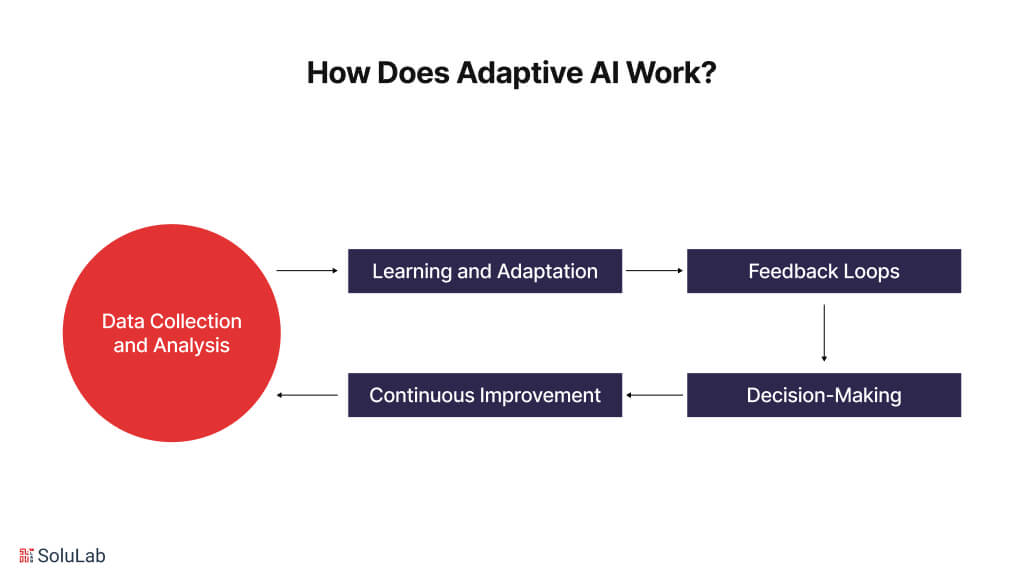
Adaptive AI is designed to evolve and improve over time, making it uniquely capable of handling complex, dynamic environments. Here’s how it works:
1. Data Collection and Analysis: Adaptive AI begins by gathering vast amounts of data from various sources. This data is continuously analyzed to identify patterns, trends, and insights that can inform decision-making processes.
2. Learning and Adaptation: Unlike traditional AI, which relies on static models, adaptive AI uses machine learning algorithms to learn from new data. As it processes more information, the AI adapts its models and strategies, improving its accuracy and performance.
3. Feedback Loops: Adaptive AI systems incorporate feedback loops that allow them to learn from their outcomes. This means that the AI can adjust its behavior based on the results of its actions, refining its approach over time.
4. Decision-Making: Based on the analyzed data and learned experiences, adaptive AI makes decisions or provides recommendations. It can optimize processes, predict outcomes, and respond to changes in real-time.
5. Continuous Improvement: Adaptive AI is not a one-time solution; it is an ongoing process. The AI continuously evolves, learning from each interaction and becoming more effective and efficient in achieving its goals.
Challenges of Implementing Adaptive AI in Businesses
Implementing Adaptive AI in business environments offers significant advantages but also comes with a set of challenges that need to be addressed to fully harness its potential. Here are some of the key challenges associated with adaptive AI development:
-
Data Quality and Quantity
Adaptive AI systems rely heavily on large volumes of high-quality data to learn and improve. Ensuring the availability of accurate and relevant data is a major challenge. Poor data quality can lead to incorrect learning and suboptimal decision-making, undermining the benefits of AI adaptive learning. Businesses must invest in robust data collection, cleaning, and management practices to support effective adaptive AI development.
-
Integration with Existing Systems
Integrating adaptive AI technology with existing business systems and processes can be complex and resource-intensive. Legacy systems may not be compatible with modern AI solutions, requiring significant modifications or even complete overhauls. Ensuring seamless integration while minimizing disruptions to ongoing operations is a critical challenge that businesses must navigate.
-
Scalability Issues
While adaptive AI systems are designed to be scalable, implementing them in a way that maintains performance as the business grows can be challenging. Scaling adaptive AI technology requires not only technical infrastructure but also skilled personnel to manage and optimize the systems. Balancing scalability with cost and resource constraints is a common issue faced by businesses.
-
High Implementation Costs
The initial costs associated with adaptive AI development and deployment including conversational AI solutions can be prohibitive for many businesses. These costs include investments in hardware, software, data infrastructure, and skilled personnel. Additionally, ongoing maintenance and updates add to the financial burden. Businesses need to carefully evaluate the return on investment and consider long-term benefits against initial expenditures.
-
Ethical and Regulatory Concerns
Adaptive AI technology raises ethical and regulatory concerns, particularly around data privacy, security, and bias. Ensuring that AI systems comply with relevant regulations and ethical standards is crucial. Businesses must implement robust governance frameworks and continuously monitor their AI systems to prevent unintended consequences and maintain public trust.
-
Skills and Expertise
The development and management of adaptive AI systems require specialized skills and expertise that may not be readily available within the organization. Businesses may need to invest in training existing employees or hiring new talent with expertise in AI adaptive learning and adaptive AI technology. Building a team with the right skills is essential but can be a significant challenge.
-
Managing Change
Implementing adaptive AI involves significant changes in business processes and workflows. Resistance to change from employees and stakeholders can hinder the successful adoption of AI technologies. Effective change management strategies, including clear communication, training, and stakeholder engagement, are necessary to overcome this challenge.
-
Ensuring Accuracy and Reliability
Adaptive AI systems must be highly accurate and reliable, particularly in critical applications such as healthcare or finance. Ensuring that these systems perform consistently and accurately under various conditions is a significant challenge. Continuous monitoring, testing, and validation are required to maintain the reliability of adaptive AI solutions.
-
Handling Complexity
Adaptive AI systems including multimodal AI solutions are designed to handle complex and dynamic environments, but this also means they can become highly complex themselves. Managing and understanding the behavior of these systems can be challenging, especially as they evolve. Businesses need robust tools and methodologies to track, analyze, and interpret AI system behaviors and outcomes.
While adaptive AI technology offers transformative potential for businesses, it also presents a range of challenges. Addressing issues related to data quality, integration, scalability, costs, ethics, skills, change management, accuracy, and complexity is crucial for successful adaptive AI development and deployment. By proactively tackling these challenges, businesses can fully leverage the benefits of AI adaptive learning and adaptive AI systems.
Final Words
Incorporating Adaptive AI into your business operations can significantly enhance efficiency, drive innovation, and improve decision-making processes. By leveraging continuous learning, adaptive AI technology can adjust to new tasks and evolving environments, offering a flexible and scalable solution that traditional AI cannot match. To utilize Adaptive AI for maximum efficiency, businesses should focus on integrating it seamlessly into their existing systems, ensuring high-quality data inputs, and continuously monitoring and optimizing its performance. The result is a more responsive and intelligent system that can provide personalized experiences, manage complex tasks, and deliver superior outcomes.
However, implementing Adaptive AI comes with its own set of challenges, including data quality, integration complexity, scalability issues, and the need for specialized skills. This is where SoluLab can make a significant difference. As a leading adaptive AI development company, SoluLab offers comprehensive solutions to overcome these hurdles. We provide end-to-end services, from initial consultation and strategy development to seamless integration and ongoing support. Our expertise ensures that your Adaptive AI systems are implemented efficiently, ethically, and in compliance with all relevant regulations. To explore how SoluLab can help your business harness the power of Adaptive AI, contact us today and start your journey towards maximum efficiency and innovation.
FAQs
1. How can Adaptive AI improve business efficiency?
Adaptive AI enhances business efficiency by automating complex tasks, providing real-time insights, and continuously optimizing processes based on feedback. This leads to faster decision-making, reduced operational costs, and improved customer experiences through personalized interactions.
2. What are the key challenges of implementing Adaptive AI?
The main challenges include ensuring high-quality data, integrating AI with existing systems, scalability, high implementation costs, and the need for specialized skills. Addressing these issues requires careful planning, robust infrastructure, and ongoing maintenance.
3. What industries can benefit from Adaptive AI?
Adaptive AI can benefit a wide range of industries, including healthcare, finance, retail, and manufacturing. It helps these sectors by improving operational efficiency, personalizing customer experiences, enhancing decision-making, and managing complex data-driven tasks more effectively.
4. How does Adaptive AI handle changing data and environments?
Adaptive AI systems are designed to continuously learn from new data and experiences, allowing them to adjust their algorithms and responses based on evolving conditions. This dynamic learning process helps them stay relevant and effective even as data patterns and business environments change.
5. Why should businesses choose SoluLab for Adaptive AI development?
Businesses should choose SoluLab because of our comprehensive approach to adaptive AI development, proven track record, and commitment to quality and innovation. SoluLab’s solutions are designed to meet specific business needs, ensuring maximum efficiency and effective AI implementation.

